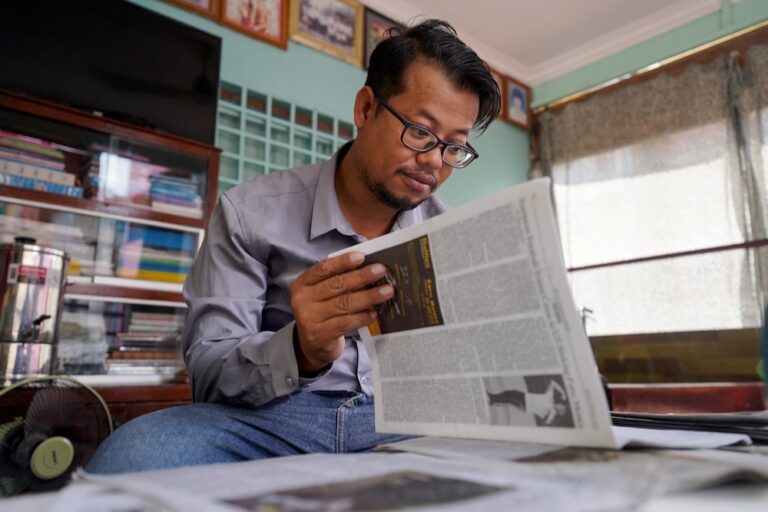(SEAPA/IFEX) – The following is a joint statement by SEAPA and the Cambodian Association for Protection of Journalists (CAPJ): Supreme Court upholds libel charge against Cambodian reporter On 31 August, Cambodia’s Supreme Court upheld a ruling by the Phnom Penh Municipality Court that journalist Kay Kimsong had libelled Foreign Minister Hor Namhong in a 2001 […]
(SEAPA/IFEX) – The following is a joint statement by SEAPA and the Cambodian Association for Protection of Journalists (CAPJ):
Supreme Court upholds libel charge against Cambodian reporter
On 31 August, Cambodia’s Supreme Court upheld a ruling by the Phnom Penh Municipality Court that journalist Kay Kimsong had libelled Foreign Minister Hor Namhong in a 2001 newspaper article suggesting he associated with the Khmer Rouge.
Kay Kimsong, a reporter with Phnom Penh’s English-language newspaper, “Cambodia Daily”, was asked to pay 30 million riel (about 7,500 U.S. dollars) in damages to the Cabinet minister, who claimed he was defamed by the story, which quoted a senator as saying he had links with the feared communist regime.
The charges were filed under Article 63 of the 1992 UNTAC (United Nations Transitional Authority in Cambodia) Penal Code.
The court rejected Kimsong’s appeal that the case be dismissed and a new trial set under the 1993 Press Law, which limits defamation lawsuits against the media to civil cases. Article 4 of the law protects journalists reporting on government officials, official documents, as well as minutes of meetings and statements.
In his appeal, Kimsong said he did not receive a fair trial and noted numerous anomalies in the court proceedings.
The court’s decision prompted protests by local media groups, including the Cambodian Association for Protection of Journalists (CAPJ). CAPJ urged a fair trial be set under the press law, in line with Cambodia’s jurisprudence.
Interviewed by the Cambodian press through a news teleconference organised by “Cambodia Daily”, the newspaper’s publisher, Bernard Krisher, said from Japan that he questioned the decision to punish Kimsong despite his minor responsibility in this defamation case.
Krisher said the Supreme Court’s decision had a bearing not only on press freedom but also on the workings of the judicial system.
He said this would not prevent “Cambodia Daily” from publishing fair and neutral reports, however.
Background
The lawsuits, originally brought against the newspaper’s editor-in-chief, a foreign journalist and Kimsong, stemmed from an article published in “Cambodia Daily” on 13 January 2001. The article quoted Senator Keo Bun Thouk as telling a Senate session she learned about Hor Namhong’s involvement in the human rights atrocities under the Democratic Kampuchea, the official name of the pro-communist Khmer Rouge regime.
On the same day. “Cambodia Daily” published a clarification as well as Hor Namhong’s letter denying his involvement with Khmer Rouge leaders. A lawsuit was filed despite the clarification.
On 24 August 2005, the Supreme Court, hearing the case on appeal, dropped charges against the two foreigners who wrote the article in question but no longer work for the newspaper. On 31 August, it ruled that Kimsong was guilty and fined the Cambodian reporter.


